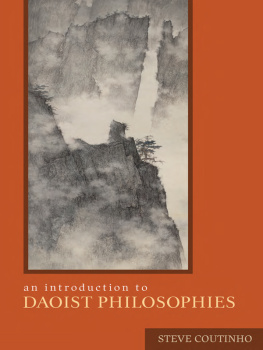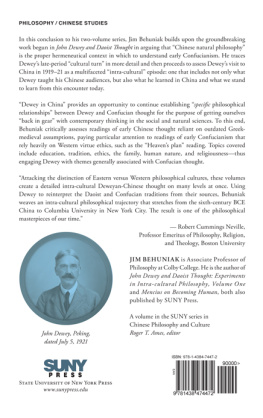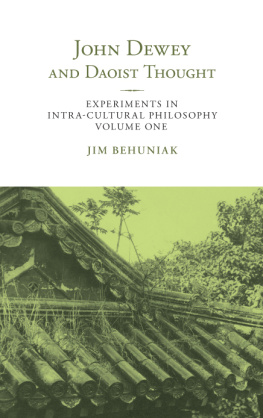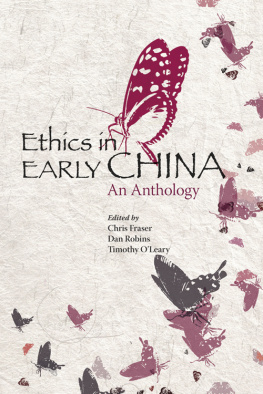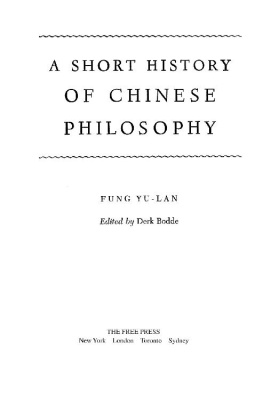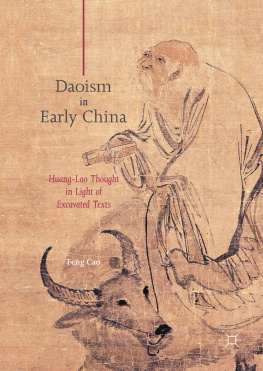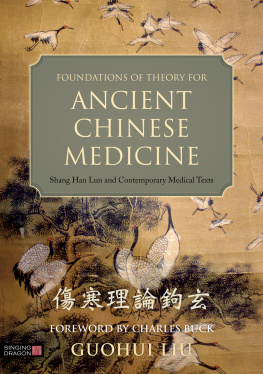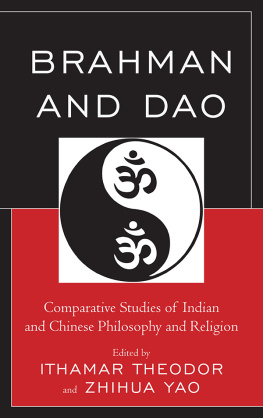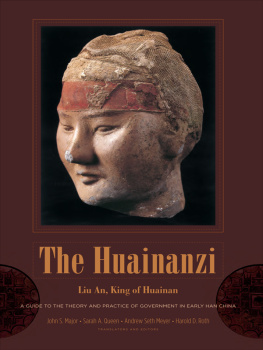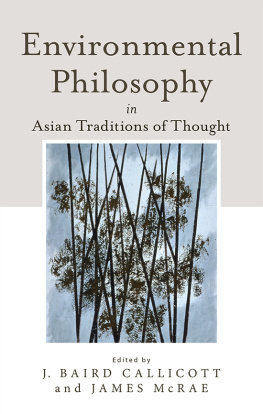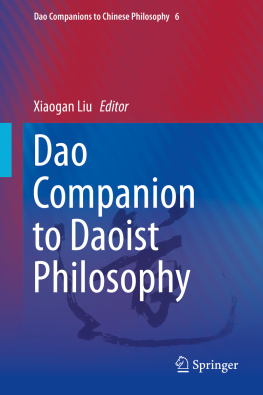An Introduction to
DAOIST PHILOSOPHIES
An Introduction to
DAOIST PHILOSOPHIES
Steve Coutinho
Columbia University Press New York
Columbia University Press
Publishers Since 1893
New York Chichester, West Sussex
cup.columbia.edu
Copyright 2014 Steve Coutinho
All rights reserved
E-ISBN 978-0-231-51288-6
Library of Congress Cataloging-in-Publication Data
Coutinho, Steve.
An introduction to Daoist philosophies / Steve Coutinho.
pages cm
Includes bibliographical references and index.
ISBN 978-0-231-14338-7 (cloth : alk. paper)
ISBN 978-0-231-14339-4 (pbk.)
ISBN 978-0-231-51288-6 (electronic)
1. Taoist philosophy. I. Title.
B162.7.C68 2013
181'.114dc23 2013003261
A Columbia University Press E-book.
CUP would be pleased to hear about your reading experience with this e-book at .
Cover design by Rebecca Lown
References to websites (URLs) were accurate at the time of writing. Neither the author nor Columbia University Press is responsible for URLs that may have expired or changed since the manuscript was prepared.
CONTENTS
The term Daoism is highly amorphous, as there is no unitary phenomenon to which it unambiguously refers. It may refer to the philosophical ideas advocated in early texts such as the Laozi and the Zhuangzi; to the syncretistic metapolitical thought of the Han dynasty; to systems of spiritual and meditative cultivation; to practices of alchemy and longevity; and to a number of institutional religious systems that have developed over the course of the last two millennia. This book does not pretend to be about all these forms of Daoism. Rather, it focuses specifically on the variety of philosophical ideas and viewpoints that are raised in three early Daoist texts.
Two texts in particular, the Laozi and the Zhuangzi, came to dominate the discourse and acquired the status of classics, at least in part because of the richness of their philosophical content. They are by no means the only early texts representative of Daoist philosophical thought. The Huainanzi and the Lshi Chunqiu, for example, contain some material that resonates with Daoist sensibility. Roger Ames and D. C. Lau have produced a study and translation of Yuan Dao, an essay from the Huainanzi that explicitly draws ideas from both the Laozi and the Zhuangzi. Harold Roth has recently produced a study of the Nei Ye chapter of the Guanzi and its possible relationship to early Daoist thought and practice. In this book, I have expanded the usual repertoire of the Laozi and the Zhuangzi with a study of the Liezi. Though it dates from a slightly later period, it is very similar to the Zhuangzi in style, spirit, and content, sharing and developing many concerns found in the earlier two texts.
Without denying the individuality of and distinctive differences among the three texts, or the plurality of voices and perspectives within each of them, they can be seen as sharing a distinctive philosophical sensibility that differentiates them from competing views of the time. Even if the authors, contributors, and commentators did not think of themselves as proponents of a single doctrine or as belonging to the same school, they are not unreasonably regarded as belonging to related traditions of thought. Broadly speaking, they each articulate a worldview that promotes a shift in emphasis from the human to the cosmic, or from the artificial to the natural. They also advocate ways of life in which we cultivate natural capacities, and modes of yielding, nurturing, nondeliberate interaction (wuwei) that have been overlooked or underdeveloped in our race to acquire culture and become civilized. Their concerns regarding humanity, technology, government, and nature are as relevant now as when they were written, and arguably more pressing than ever before. What the right name for this broad philosophical sensibility should be is a moot question. It has come to be known as Daoism, and probably will be called that for a long time to come. But since it has multiple manifestations, I shall use the plural form, Daoist philosophies.
This book provides a thorough scholarly introduction to the fundamental concepts of the various branches of Daoist thought represented in these three texts. It is written for two types of readers: those interested in philosophy who want to expand their range to include Daoism; and those interested in ancient China who wish to deepen their understanding of the philosophical issues raised by these texts.
It is first and foremost a work of comparative philosophy, using current concepts and methods of discourse: explication of philosophical concepts, articulation of philosophical theories, analysis of the philosophical problems that arise from them, and most importantly, exploration of attempts to solve those problems and thereby contribute to the development of those concepts and theories. It is thus the product of what Gadamer calls a fusion of horizons: ancient Chinese discourse is used to aid our understanding of contemporary issues, and modern Western concepts and methods are used to read the ancient texts in a new light. Although it is an introduction, this study aims to stay true to the richness and complexity of the philosophical ideas without oversimplification.
, after a brief discussion of each text and its authorship, proceed to elucidate the important concepts of the Daoist texts, noting deep differences from familiar Western concepts when appropriate. Generally speaking, these terms do not have direct equivalents in Western philosophy: resorting too quickly to familiar concepts results in common misunderstandings. Rather, the terms require extended explanations of their significances and associations in Daoist discourse. This constitutes a sort of textual phenomenology: a mapping of concepts and conceptual differences by noting the associations, and consequent ranges of conceptual possibility, that are recorded in the texts. The ordering of concepts is significant: which are taken as central and which peripheral sets the tenor of the philosophy. For the most part, I begin with what I consider to be the most general concepts, the worldviews in terms of which the overall philosophy must be understood, and then work inward, as it were, from the cosmological and ontological to the existential, epistemological, and political.
My goal is to provide an interpretation of the early Daoist philosophies that respects their multiplicity and at the same time reveals their coherence as alternative developments of a distinctive philosophical sensibility. While there is no fixed essence of Daoist thought, I find several related notions close to its core: a shift in emphasis from the human to the cosmic, from the artificial to the natural; cultivation of natural life and tranquility; embodying natural spontaneity by diminishing artificial interference (wuwei); and an appreciation for the deeper productive value of emptiness, nothing, retreat, and reversal. I present and engage with traditional interpretations critically, and where I disagree I marshal arguments against them. It should go without saying that I do not present my views dogmatically, but in the spirit of continued open discourse.
Throughout the text, I draw attention to a recurring problem for Daoist philosophy: how can a philosophy that rejects humanistic values make sure it steers clear of inhumanity? The Zhuangzi text itself contains a formulation of this problem in chapter 23 (see pages 1034 below). As I was finalizing the manuscript, I realized that the Utopian strand of Daoist thought might well have the conceptual resources for providing a naturalistic solution to this problem; I sketch the gist of the solution, but do not have the space here to develop it further.

